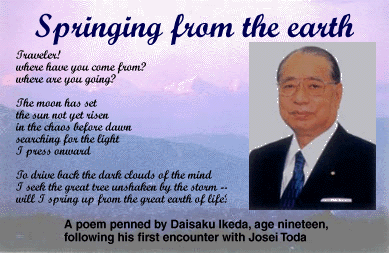

The background picture is the Himalayas,
photographed by Daisaku Ikeda, 1995
![]()
Daisaku
Ikeda was born in Tokyo on January 2, 1928, the fifth of eight children, to a family of
seaweed farmers. As a teenager he lived through the Second World War, and its senseless
horror left an indelible mark on his life. His four older brothers were drafted into
military service ; the eldest was killed in action. These experiences, along with the
human anguish and turmoil he witnessed in the years following the war, continue to fuel
his lifelong quest to root out the fundamental causes of human conflict and suffering. |
Daisaku Ikeda with his wife |
| In 1952, Ikeda
married Kaneko Shiraki. Comrade and confidante ever since, she has been his constant
companion in his journeys for peace for more than forty years. In May 1960, two years
after Toda's death, Ikeda succeeded him as president of the Soka Gakkai. Under his
leadership, the movement began an era of innovation and expansion, becoming actively
engaged in cultural and educational endeavours worldwide. In 1975, Ikeda became the first
president of the Soka Gakkai International (SGI), an association that today includes more
than 10 million members in Japan and some 1.3 million members in 127 countries and
territories around the world. Ikeda regards the late Arnold Toynbee as one of his most important intellectual influences. From 1971 to 1974, the two conducted a broad ranging dialogue, later published as "Choose Life" and translated into twenty languages. Toynbee and Ikeda's dialogue was the expression of a shared faith in discourse between people of widely different backgrounds as an effective means of finding solutions to challenges facing humankind. Ikeda recalls that it was Toynbee who urged him to continue this process of dialogue across philosophical and ideological boundaries. Central to Ikeda's thinking is the idea that a self-directed transformation within the life of each individual, rather than societal or structural reforms alone, holds the key to lasting peace and human happiness. This is based on the Buddhist principle that all individuals possess the ability to create limitless value in harmony with others. It is expressed perhaps most succinctly in the following passage from "The Human Revolution", Ikeda's novelisation of the Soka Gakkai's history and development: "A great revolution in just a single individual will help achieve a change in the destiny of a society, and further, will enable a change in the destiny of humankind." All of Ikeda's activities-his writings, lectures and dialogues, as well as the various institutions he has founded-are directed to promoting an understanding that the resources and potential to make a real and lasting difference in our world are to be found within the life of each individual. In a world where powerlessness, cynicism and pessimism about the future abound, this message is perhaps more timely than ever. |